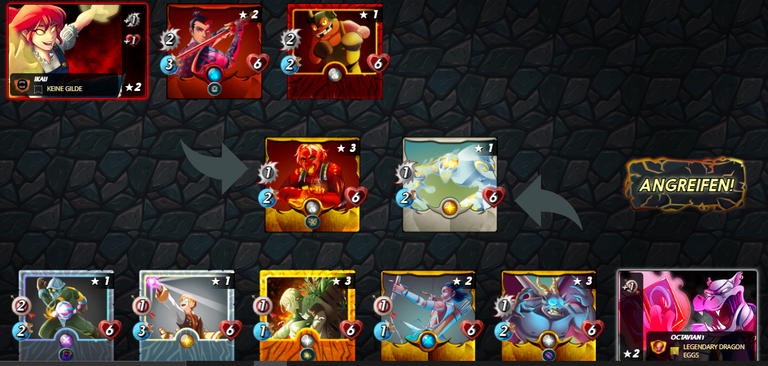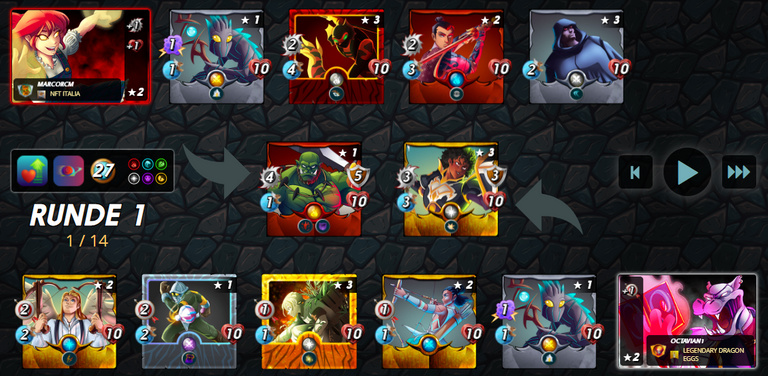
As we all know, there are many different rulesets in Splinterlands. Together with the ever-changing mana costs and splinters you are allowed to play, they add variety, but also mean that cards that aren't normally that strong can suddenly become very useful.
Personally, it took me quite a while to internalize all the different rulesets, and even longer to have a passable to good strategy, splinters, and appropriate cards in mind.
One ruleset, however, opened up to me relatively quickly: the Equalizer ruleset.
However, I still encounter a lot of opponents who don't seem to understand the basic principle of this ruleset. After I recently won twice in a bronze tournament in this ruleset, because the opponent failed to align his team to the Equalizer ruleset, I got the idea for this post.
The rules are actually quite simple: All monsters on the field get the same amount of health as the monster with the highest health at the beginning of the game (without buffs, these only take effect after the game starts).
From this, a basic principle for ALL matches can be derived: Line up as many monsters as possible! If possible, you should fill all 6 spots.
This is the starting point for all further thoughts. There are other things to consider in this ruleset, which I will go into in a moment.
But I want to clarify first that even a 0 mana Minion like Chicken or a Fiend can suddenly get a lot of health in a matchup like this, and even if it's only boosted to 4, it's still improved the card significantly in its own right. If your team has 6 minions on the field and your opponent only has 3, then you have twice as much health on the field as they do. You have to have a lot going for you to make up for that.
I've encountered matches where someone will even just dump one big Minion like Kron the Undying with his 10 life, and then 2 more Minions, or even none at all. My team then consists of 6 Minions with 10 life each.
Wie wir alle wissen, gibt es in Splinterlands viele verschiedene Rulesets. Zusammen mit den immer wechselnden Manakosten und Splintern, die man spielen darf, sorgen sie für Abwechslung, aber auch dafür, dass Karten, die normalerweise nicht so stark sind, plötzlich sehr nützlich werden können.
Ich persönlich habe eine ganze Weile gebraucht, bis ich alle verschiedenen Rulesets verinnerlicht hatte, und noch länger, bis ich eine passable bis gute Strategie, Splinter und geeignete Karten im Kopf hatte.
Ein Ruleset hat sich mir jedoch relativ schnell erschlossen: das Equalizer Ruleset.
Mir begegnen aber bis heute sehr viele Gegner, die das Grundprinzip von diesem Ruleset nicht zu verstehen scheinen. Nachdem ich neulich in einem Bronze Turnier gleich zweimal in diesem Ruleset gewonnen habe, weil der Gegner jeweils eklatant versagt hat, sein Team auf das Equalizer Ruleset auszurichten, kam mir die Idee für diesen Post.
Die Regeln sind eigentlich recht simpel: Alle Monster auf dem Feld erhalten die gleiche Anzahl an Lebenspunkten wie das Monster mit den höchsten Lebenspunkten zu Beginn des Spiels (ohne Buffs, diese wirken erst nach Spielbeginn).
Daraus lässt sich zunächst ein Grundprinzip für ALLE Matches ableiten: Stelle so viele Monster wie möglich auf! Wenn möglich, solltest du die 6 auch voll machen.
Dies ist der Ausgangspunkt aller Überlegungen. Es gibt noch weitere Dinge, die in diesem Ruleset zu beachten sind, auf die ich sogleich näher eingehen werde.
Es ist aber erst einmal so, dass selbst ein 0 Mana Minion wie Chicken oder ein Fiend in so einem Matchup plötzlich verdammt viel Leben bekommen kann, und selbst wenn es nur auf 4 gesteigert wird, so hat es die Karte für sich genommen doch deutlich verbessert. Wenn dein Team 6 Minions auf dem Feld hat und der Gegner nur 3, dann hast du doppelt so viel Leben auf dem Feld wie er. Da muss schon einiges kommen, um das auszugleichen.
Mir begegnen immer wieder Matches, in denen jemand sogar nur ein dickes Minion wie z.B. Kron the Undying mit seinen 10 Leben aufstellt, und anschließend 2 weitere Minions, oder sogar gar keins. Mein Team besteht dann aus 6 Minions mit jeweils 10 Leben.

This is the one of the tournament games I just mentioned. As you can easily see, my team is already far superior here because the minions on the field are 6 vs 3. You can see how it turned out
here, but I think a single glance is already sufficient in this case.
In this match, however, my opponent made another basic mistake that I want to tell you as well: he split his damage unnecessarily.
It's always better to concentrate your damage anyway. What's the point of a sneak, a snipe, and an opportunity monster if all of them just scratch the opponent in the first round, while the latter takes down the tank in no time with concentrated damage and all of those minions have to move up to the front? This is even more true in the Equalizer ruleset!
The Tenyii Striker needs 2 hits to take down a minion in the match above. But he only managed one and then moved up, so the damage was for nothing. If you use sneak in Equalizer, use it with a lot of minions, otherwise you can forget it right away.
Opportunity is also not as good as usual, because mostly the foremost minion is attacked. But at least melee minions from the backline can attack reliably.
You should also make sure to take minions with rather low to moderate health points with you. In the end, they all get the same amount of health, but often a minion with little health has other strengths that are usually balanced out by the lack of health. Chaos Knight, Chain Spinner, Exploding Rats, and Pelacor Arbalest are just a few examples of this.
Feel free to let the opponent do the work and let them pick a high health minion that yours can benefit from.
Finally, let's look at the abilities that seem special in the Equalizer ruleset:
Lifeleech: Minions with Lifeleech often have the problem that they have to build up life before they get really good. In the Equalizer ruleset, this is not a problem. Ancient Lich, for example, is a very good choice for this.
Armor/Void Armor: Armor suddenly pays off more, because it comes on top. Void Armor also cannot be ignored by Magic. Legionaire Alvar is a prime example of this.
Blast: Since we need to knock away a lot of life, blast is a reliable way to maximize damage here. There will probably be a lot of attacks to get the full potential of this ability. Prismologist would be a good example of this.
Poison: Poison is especially useful on minions with a lot of life, as once a minion is poisoned, it drains 2 health every turn.
Heal: The exact opposite of poison. Minions with a lot of healthcan be healed a lot. In this ruleset, most of them have a lot of health.
Affliction: Can be used as a counter to an opponent's Heal.
Dies ist das eine der eben erwähnten Turnierspiele. Wie du unschwer erkennen kannst, ist mein Team hier bereits deshalb weit überlegen, weil es 6 zu 3 steht. Wie es ausging, kannst du dir
hier anschauen, ich denke aber, ein einziger Blick ist in dem Fall bereits ausreichend.
In diesem Match hat mein Gegner allerdings einen weiteren grundsätzlichen Fehler begangen, den ich dir nicht vorenthalten möchte: Er hat seinen Schaden unnötig aufgeteilt.
Es ist ganz grundsätzlich eh immer besser, seinen Schaden zu konzentrieren. Was bringen ein Sneak, ein Snipe und ein Opportunity Monster schon, wenn alle den Gegner in der ersten Runde nur ankratzen, während dieser mit konzentriertem Schaden den Tank im Nu runtermacht und alle diese (als Tank sehr nutzlosen) Minions nach vorne aufrücken müssen? Dies gilt erst recht im Equalizer Ruleset!
Der Tenyii Striker braucht im obigen Match 2 Hits, um ein Minion zu erledigen. Er schaffte aber nur einen und rückte dann auf, der Schaden war also umsonst. Wenn man im Equalizer Sneak anwendet, dann mit vielen Minions, sonst kann man es gleich vergessen.
Opportunity ist hier auch nicht so gut wie sonst, da meist das vorderste Minion angegriffen wird. Immerhin jedoch können so Melee Minions aus der Backline zuverlässig angreifen.
Auch sollte man darauf achten, Minions mit eher niedrigen bis moderaten Lebenspunkten mitzunehmen. Letztlich kriegen zwar alle das gleiche Leben, aber oftmals hat ein Minion mit wenig Leben andere Stärken, die im Normalfall gerade durch das fehlende Leben ausbalanciert werden. Chaos Knight, Chain Spinner, Exploding Rats und Pelacor Arbalest sind nur ein paar Beispiele hierfür.
Lass ruhig den Gegner die Arbeit machen und ihn ein Minion mit hohem Leben auswählen, von dem deine profitieren können.
Kommen wir zum Schluss zu den Fähigkeiten, die im Equalizer Ruleset besonders scheinen:
Lifeleech: Minions mit Lifeleech haben oftmals das Problem, dass sie erst Leben aufbauen müssen, ehe sie so richtig gut werden. Im Equalizer Ruleset ist das kein Problem. Ancient Lich ist z.B. eine sehr gute Wahl hierfür.
Rüstung/Void Armor: Rüstung zahlt sich plötzlich mehr aus, denn diese kommt noch oben drauf. Void Armor kann außerdem nicht von Magic ignoriert werden. Legionaire Alvar ist dafür ein Paradebeispiel.
Blast: Da wir viel Leben weghauen müssen, ist Blast hier ein zuverlässiger Weg zur Schadensmaximierung. Es wird vermutlich viele Angriffe geben, um das volle Potenzial dieser Fähigkeit auszuschöpfen. Prismologist wäre hierfür ein gutes Beispiel.
Poison: Poison ist besonders nützlich bei Minions mit viel Leben, da es - sobald ein Minion einmal vergiftet ist - jede Runde 2 Leben abzieht.
Heal: Das genaue Gegenteil zu Poison. Minions mit viel Leben können viel geheilt werden. In diesem Ruleset haben meist alle sehr viel Leben.
Affliction: Kann zur Absicherung eingesetzt werden, um gegnerischen Heal gezielt zu kontern.

This is the other tournament match. Here you can also see that my opponent:
1st: Only selected 5 minions and I have 6 on the field.
2nd: He split his damage unnecessarily, while I concentrated my damage on one position.
3.: He chose the minion with the most health with Grum Flameblade, while for me the Chaos Knight with 4 health is the upper limit.
I think now you can understand what I mean.
I'm sure I haven't told you everything there is to tell about this ruleset either. Maybe I missed an important ability or you think this mode should be approached differently? Feel free to write it to me in the comments.
Cheers. 🙂
The HSBI share for this post goes to @louis88.
Dies ist das andere Turniermatch. Auch hier sieht man, dass mein Gegner:
1.: Nur 5 Minions ausgewählt hat und bei mir 6 auf dem Feld stehen.
2.: Er seinen Schaden unnötig aufgeteilt hat, während ich meinen Schaden maximal auf eine Position konzentriert habe.
3.: Er mit Grum Flameblade das Minion mit den meisten Lebenspunkten ausgewählt hat, während bei mir der Chaos Knight mit 4 Leben die Obergrenze bildet.
Ich denke, du kannst damit nachvollziehen, was ich meine.
Sicherlich habe ich auch nicht alles erzählt, was es zu diesem Ruleset zu erzählen gibt. Vielleicht habe ich eine wichtige Fähigkeit übersehen oder du bist der Meinung, man sollte diesen Modus ganz anders angehen? Schreib es mir gerne in die Kommentare.
Cheers. 🙂
Der HSBI Share für diesen Post geht an @louis88.
Click here if you want to use my Splinterlands referral link.







